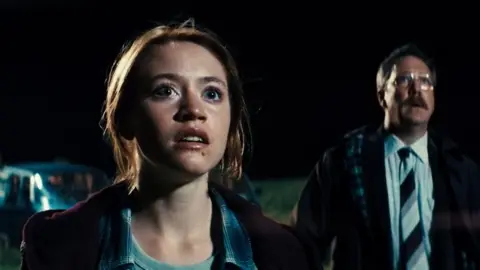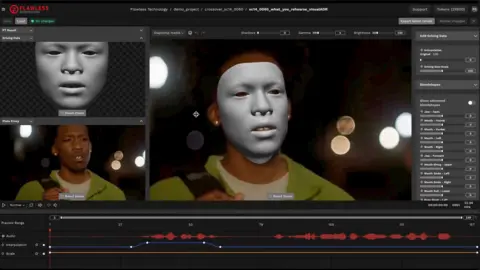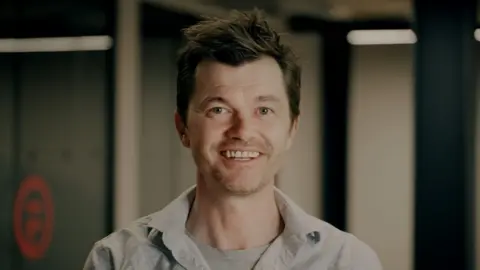Technology Press reporter
 XYZ Films
XYZ Films Finding worldwide films that might attract the US market is an important part of the job XYZ Films.
Maxime Cottray is the chief running officer at the Los Angeles-based independent workshop.
He says the US market has actually constantly been tough for international language movies.
“It’s been limited to coastal New york city viewers via art house movies,” he says.
It’s partly a language issue.
“America is not a society which has actually matured with subtitles or calling like Europe has,” he mentions.
Yet that language difficulty might be easier to clear with a new
The sound and video of a recent film, Enjoy the Skies, a Swedish sci-fi movie, was fed right into an electronic device called DeepEditor.
It manipulates the video clip to make it look like stars are really talking the language the movie is made right into.
“The first time I saw the results of the technology two years ago I thought it was great, but having seen the most recent cut, it’s impressive. I’m convinced that if the typical individual if saw it, they would not discover it – they ‘d assume they were talking whatever language that is,” says Mr Cottray.
The English version of Watch The Skies was released in 110 AMC Theatres across the United States in May.
“To contextualise this result, if the movie were not dubbed into English, the movie would never ever have actually made it into United States cinemas in the first place,” claims Mr Cottray.
“United States target markets had the ability to see a Swedish independent film that otherwise just an extremely niche target market would certainly have or else seen.”
He states that AMC prepares to run more releases like this.
 Perfect
Perfect DeepEditor was created by Remarkable, which is headquartered in Soho, London.
Author and supervisor Scott Mann founded the company in 2020, having actually worked on films including Heist, The Tournament and Last Score.
He really felt that conventional calling techniques for the international versions of his films didn’t rather match the psychological impact of the originals.
“When I worked with Heist in 2014, with a fantastic actors including Robert De Niro, and after that I saw that film equated to a various language, that’s when I initially realised that not surprising that the flicks and TV don’t travel well, because the vintage of dubbing really type of modifications whatever regarding the movie,” says Mr Mann, currently based in Los Angeles.
“It’s all out of sync, and it’s executed differently. And from a perfectionist filmmaking viewpoint, a significantly reduced grade product is being seen by the rest of the world.”
 Remarkable
Remarkable Remarkable established its own technology for recognizing and modifying faces, based on a technique initially offered in a term paper in 2018
“DeepEditor uses a mix of face discovery, face acknowledgment, site discovery [such as facial features] and 3 D face tracking to understand the actor’s look, physical activities and emotional efficiency in every shot,” says Mr Mann.
The technology can preserve actors’ initial efficiencies across languages, without reshoots or re-recordings, minimizing expenses and time, he claims.
According to him, Enjoy the Skies was the world’s initial fully visually-dubbed attribute film.
In addition to offering an actor the look of talking another language, DeepEditor can additionally move a far better efficiency from one take right into one more, or switch a brand-new line of dialogue, while maintain the initial performance with its emotional content undamaged.
Many thanks to the explosion of streaming systems such as Netflix and Apple, the international movie referring to as market is readied to boost from US$ 4 bn (₤ 3 bn) in 2024 to $ 7 6 bn by 2033, according to a report by Business Research Study Insights.
Mr Mann will not say just how much the technology costs yet says it differs per job. “I ‘d state it exercises at concerning a tenth of the cost of shooting it or changing it otherwise.”
His customers consist of “virtually all the truly huge streamers”.
Mr Mann thinks the innovation will certainly enable movies to be seen by a bigger audience.
“There is a huge amount of extraordinary sort of cinema and television out there that is just never ever seen by English speaking folks, due to the fact that lots of do not intend to see it with referring to as and subtitles,” says Mr Mann.
The technology isn’t below to replace stars, claims Mann, that claims voice stars are made use of instead of being replaced with artificial voices.
“What we found is that if you make the tools for the actual creatives and the musicians themselves, that’s the right way of doing it … they obtain sort of the power devices to do their art and that can feed into the finished product. That’s the reverse of a lot of strategies that other technology companies have actually taken.”
 Natan Dvir
Natan Dvir Nonetheless, Neta Alexander, assistant teacher of film and media at Yale College, says that while the guarantee of wider circulation is alluring, making use of
“If all foreign movies are adjusted to look and seem English, the target market’s relationship with the international becomes increasingly moderated, synthetic, and sanitised,” she says.
“This could discourage cross-cultural proficiency and disincentivise assistance for subtitled or original-language testings.”
On the other hand, she says, the variation of subtitles, a crucial device for language learners, immigrants, deaf and hard-of-hearing audiences and many others, increases issues about access.
“Shut captioning is not just a workaround; it’s a method of preserving the stability of both visual and auditory storytelling for varied target markets,” claims Prof Alexander.
Replacing this with computerized mimicry suggests a troubling turn toward commodified and monolingual movie culture, she claims.
“Rather than ask exactly how to make foreign movies easier for English-speaking audiences, we could much better ask how to build target markets that agree to satisfy diverse cinema by itself terms.”


